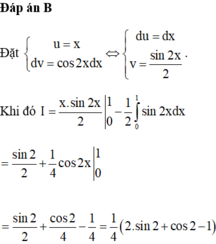Biết rằng ∫ 0 1 x c o s 2 x d x = 1 4 ( a sin 2 + b cos 2 + c ) , với a , b , c ∈ Z . Mệnh đề nào sau đây là đúng?
A. a+b+c=1
B. a-b+c=0
C. a+2b+c=1
D. 2a+b+c=-1
Hãy nhập câu hỏi của bạn vào đây, nếu là tài khoản VIP, bạn sẽ được ưu tiên trả lời.



a/
\(Q\left(2\right).Q\left(-1\right)=\left(4a+2b+c\right)\left(a-b+c\right)=\left(5a+b+2c-a+b-c\right)\left(a-b+c\right)\)
\(=\left(-a+b-c\right)\left(a-b+c\right)=-\left(a-b+c\right)^2\le0\)
b/
Q(x) = 0 với mọi x, suy ra các điều sau:
\(\Rightarrow Q\left(0\right)=c=0\); \(Q\left(1\right)=a+b+c=a+b=0\); \(Q\left(-1\right)=a-b+c=a-b=0\)
\(\Rightarrow\left(a+b\right)+\left(a-b\right)=0\text{ và }\left(a+b\right)-\left(a-b\right)=0\)\(\Leftrightarrow2a=0\text{ và }2b=0\Leftrightarrow a=b=0\)
Vậy \(a=b=c=0\)

a) \(4sinx-1=1\Leftrightarrow4sinx=2\Leftrightarrow sinx=\dfrac{2}{4}=\dfrac{1}{2}\)
\(\Leftrightarrow x=30^o\)
b) \(2\sqrt{3}-3tanx=\sqrt{3}\Leftrightarrow3tanx=2\sqrt{3}-\sqrt{3}=\sqrt{3}\Leftrightarrow tanx=\dfrac{\sqrt{3}}{3}\)
\(\Leftrightarrow x=30^o\)
c) \(7sinx-3cos\left(90^o-x\right)=2,5\Leftrightarrow7sinx-3sinx=2,5\Leftrightarrow4sinx=2,5\Leftrightarrow sinx=\dfrac{5}{8}\Leftrightarrow x=30^o41'\)
d)\(\left(2sin-\sqrt{2}\right)\left(4cos-5\right)=0\)
\(\Rightarrow\left[{}\begin{matrix}2sin-\sqrt{2}=0\\4cos-5=0\end{matrix}\right.\)\(\Leftrightarrow\left[{}\begin{matrix}2sin=\sqrt{2}\\4cos=5\end{matrix}\right.\)\(\Leftrightarrow\left[{}\begin{matrix}sin=\dfrac{\sqrt{2}}{2}\\cos=\dfrac{5}{4}\left(loai\right)\end{matrix}\right.\)\(\Rightarrow x=45^o\)
Xin lỗi nãy đang làm thì bấm gửi, quên còn câu e, f nữa:"(
e) \(\dfrac{1}{cos^2x}-tanx=1\Leftrightarrow1+tan^2x-tanx-1=0\Leftrightarrow tan^2x-tanx=0\Leftrightarrow tanx\left(tanx-1\right)=0\Rightarrow tanx-1=0\Leftrightarrow tanx=1\Leftrightarrow x=45^o\)
f) \(cos^2x-3sin^2x=0,19\Leftrightarrow1-sin^2x-3sin^2x=0,19\Leftrightarrow1-4sin^2x=0,19\Leftrightarrow4sin^2x=0,81\Leftrightarrow sin^2x=\dfrac{81}{400}\Leftrightarrow sinx=\dfrac{9}{20}\Leftrightarrow x=26^o44'\)

a) \(\left(sinx+cosx\right)^2=sin^2x+2sinxcosx+cos^2x\)\(=1+2sinxcosx\).
b) \(\left(sinx-cosx\right)^2=sin^2x-2sinxcosx+cos^2x\)\(=1-2sinxcosx\).
c) \(sin^4x+cos^4x=\left(sin^2x+cos^2x\right)^2-2sin^2xcos^2x\)
\(=1-2sin^2xcos^2x\).

Lời giải:
a)
\(\frac{1-\cos x}{\sin x}=\frac{(1-\cos x)(1+\cos x)}{\sin x(1+\cos x)}=\frac{1-\cos ^2x}{\sin x(1+\cos x)}=\frac{\sin ^2x}{\sin x(1+\cos x)}=\frac{\sin x}{1+\cos x}\)
b)
\((\sin x+\cos x-1)(\sin x+\cos x+1)=(\sin x+\cos x)^2-1^2\)
\(=\sin ^2x+\cos ^2x+2\sin x\cos x-1=1+2\sin x\cos x-1=2\sin x\cos x\)
c)
\(\frac{\sin ^2x+2\cos x-1}{2+\cos x-\cos ^2x}=\frac{1-\cos ^2x+2\cos x-1}{2+\cos x-\cos ^2x}=\frac{-\cos ^2x+2\cos x}{2+\cos x-\cos ^2x}\)
\(=\frac{\cos x(2-\cos x)}{(2-\cos x)(\cos x+1)}=\frac{\cos x}{\cos x+1}\)
d)
\(\frac{\cos ^2x-\sin ^2x}{\cot ^2x-\tan ^2x}=\frac{\cos ^2x-\sin ^2x}{\frac{\cos ^2x}{\sin ^2x}-\frac{\sin ^2x}{\cos ^2x}}=\frac{\sin ^2x\cos ^2x(\cos ^2x-\sin ^2x)}{\cos ^4x-\sin ^4x}\)
\(=\frac{\sin ^2x\cos ^2x(\cos ^2x-\sin ^2x)}{(\cos ^2x-\sin ^2x)(\cos ^2x+\sin ^2x)}=\frac{\sin ^2x\cos ^2x}{\sin ^2x+\cos ^2x}=\sin ^2x\cos ^2x\)
e)
\(1-\cot ^4x=1-\frac{\cos ^4x}{\sin ^4x}=\frac{\sin ^4x-\cos ^4x}{\sin ^4x}=\frac{(\sin ^2x-\cos ^2x)(\sin ^2x+\cos ^2x)}{\sin ^4x}\)
\(=\frac{\sin ^2x-\cos ^2x}{\sin ^4x}=\frac{\sin ^2x-(1-\sin ^2x)}{\sin ^4x}=\frac{2\sin ^2x-1}{\sin ^4x}=\frac{2}{\sin ^2x}-\frac{1}{\sin ^4x}\)
Ta có ddpcm.

\(sina+sinb+sinc+3=0\)
\(\Leftrightarrow\left(sina+1\right)+\left(sinb+1\right)+\left(sinc+1\right)=0\)
Do \(\left\{{}\begin{matrix}sina\ge-1\\sinb\ge-1\\sinc\ge-1\end{matrix}\right.\) ;\(\forall a;b;c\)
\(\Rightarrow\left(sina+1\right)+\left(sinb+1\right)+\left(sinc+1\right)\ge0\)
Dấu "=" xảy ra khi và chỉ khi \(sina=sinb=sinc=-1\)
\(\Rightarrow cosa=cosb=cosc=0\Rightarrow cosa+cosb+cosc+10=10\)
b/ \(sinx=1-sin^2x\Rightarrow sinx=cos^2x\)
\(\Rightarrow sin^2x=cos^4x\Rightarrow1-cos^2x=cos^4x\)
\(\Rightarrow cos^4x+cos^2x=1\Rightarrow\left(cos^4x+cos^2x\right)^2=1\)
\(\Rightarrow cos^8x+2cos^6x+cos^4x=1\)

\(f\left(x\right)=ax^2+bx+c\Rightarrow\hept{\begin{cases}f\left(0\right)=c\\f\left(1\right)=a+b+c\\f\left(2\right)=4a+2b+c\end{cases}}\)
\(f\left(0\right)\) nguyên \(\Rightarrow c\) nguyên \(\Rightarrow\hept{\begin{cases}2a+2b\\4a+2b\end{cases}}\) nguyên
\(\Rightarrow\left(4a+2b\right)-\left(2a+2b\right)=2a\)(nguyên)
\(\Rightarrow2b\) nguyên
\(\Rightarrowđpcm\)

d.
\(\Leftrightarrow\left(sin^2x-cos^2x\right)\left(sin^2x+cos^2x\right)=0\)
\(\Leftrightarrow sin^2x-cos^2x=0\)
\(\Leftrightarrow-cos2x=0\)
\(\Leftrightarrow2x=\frac{\pi}{2}+k\pi\)
\(\Leftrightarrow x=\frac{\pi}{4}+\frac{k\pi}{2}\)
e. Đề thiếu
f.
\(\Leftrightarrow sin2x=\left(cos^2\frac{x}{2}-sin^2\frac{x}{2}\right)\left(cos^2\frac{x}{2}+sin^2\frac{x}{2}\right)\)
\(\Leftrightarrow sin2x=cos^2\frac{x}{2}-sin^2\frac{x}{2}\)
\(\Leftrightarrow sin2x=cosx\)
\(\Leftrightarrow sin2x=sin\left(\frac{\pi}{2}-x\right)\)
\(\Leftrightarrow\left[{}\begin{matrix}2x=\frac{\pi}{2}-x+k2\pi\\2x=x-\frac{\pi}{2}+k2\pi\end{matrix}\right.\)
\(\Leftrightarrow\left[{}\begin{matrix}x=\frac{\pi}{6}+\frac{k2\pi}{3}\\x=-\frac{\pi}{2}+k2\pi\end{matrix}\right.\)
a.
\(\Leftrightarrow\left[{}\begin{matrix}sinx=-1\\sinx=\sqrt{2}>1\left(l\right)\end{matrix}\right.\)
\(\Rightarrow x=-\frac{\pi}{2}+k2\pi\)
b.
\(\Leftrightarrow sin2x=1\)
\(\Leftrightarrow2x=\frac{\pi}{2}+k2\pi\)
\(\Leftrightarrow x=\frac{\pi}{4}+k\pi\)
c.
\(\Leftrightarrow2sin2x.cos2x=-1\)
\(\Leftrightarrow sin4x=-1\)
\(\Leftrightarrow4x=-\frac{\pi}{2}+k2\pi\)
\(\Leftrightarrow x=-\frac{\pi}{8}+\frac{k\pi}{2}\)

a)
\(4\sin (3x+\frac{\pi}{3})-2=0\Leftrightarrow \sin (3x+\frac{\pi}{3})=\frac{1}{2}=\sin (\frac{\pi}{6})\)
\(\Rightarrow \left[\begin{matrix} 3x+\frac{\pi}{3}=\frac{\pi}{6}+2k\pi \\ 3x+\frac{\pi}{3}=\pi-\frac{\pi}{6}+2k\pi\end{matrix}\right.\)
\(\Leftrightarrow \left[\begin{matrix} x=\frac{-\pi}{18}+\frac{2\pi}{3}\\ x=\frac{\pi}{6}+\frac{2\pi}{3}\end{matrix}\right.\) (k nguyên)
c)
\(\sin (x+\frac{x}{4})-1=0\Leftrightarrow \sin (\frac{5}{4}x)=1=\sin (\frac{\pi}{2})\)
\(\Rightarrow \frac{5}{4}x=\frac{\pi}{2}+2k\pi\Rightarrow x=\frac{2}{5}\pi+\frac{8}{5}k\pi \) (k nguyên)
d)
\(2\sin (2x+70^0)+1=0\Leftrightarrow \sin (2x+\frac{7}{18}\pi)=-\frac{1}{2}=\sin (\frac{-\pi}{6})\)
\(\Rightarrow \left[\begin{matrix} 2x+\frac{7}{18}\pi=\frac{-\pi}{6}+2k\pi\\ 2x+\frac{7}{18}\pi=\frac{7}{6}\pi+2k\pi\end{matrix}\right.\)
\(\Leftrightarrow \left[\begin{matrix} x=\frac{-5\pi}{18}+k\pi\\ x=\frac{7}{18}\pi+k\pi\end{matrix}\right.\)
f)
\(\cos 2x-\cos 4x=0\)
\(\Leftrightarrow \cos 2x=\cos 4x\Rightarrow \left[\begin{matrix} 4x=2x+2k\pi\\ 4x=-2x+2k\pi\end{matrix}\right.\)
\(\Rightarrow \left[\begin{matrix} x=k\pi\\ x=\frac{k}{3}\pi \end{matrix}\right.\) ( k nguyên)
b,e,g bạn xem lại đề, đơn vị không thống nhất.

a.
\(1-sin^2x+1-2sin^2x+sinx+2=0\)
\(\Leftrightarrow-3sin^2x+sinx+4=0\)
\(\Leftrightarrow\left[{}\begin{matrix}sinx=-1\\sinx=\frac{4}{3}\left(l\right)\end{matrix}\right.\)
\(\Rightarrow x=-\frac{\pi}{2}+k2\pi\)
b. ĐKXĐ; ...
\(5tanx-\frac{2}{tanx}-3=0\)
\(\Leftrightarrow5tan^2x-3tanx-2=0\)
\(\Leftrightarrow\left[{}\begin{matrix}tanx=1\\tanx=-\frac{2}{5}\end{matrix}\right.\)
\(\Leftrightarrow\left[{}\begin{matrix}x=\frac{\pi}{4}+k\pi\\x=arctan\left(-\frac{2}{5}\right)+k\pi\end{matrix}\right.\)
e.
Ko rõ vế phải
f.
\(\Leftrightarrow1-3sin^2x.cos^2x=\frac{5}{6}\left(1-2sin^2x.cos^2x\right)\)
\(\Leftrightarrow1-\frac{3}{4}sin^22x=\frac{5}{6}\left(1-\frac{1}{2}sin^22x\right)\)
\(\Leftrightarrow1-2sin^22x=0\)
\(\Leftrightarrow cos4x=0\)
\(\Leftrightarrow x=\frac{\pi}{8}+\frac{k\pi}{4}\)

a.
\(\left(sin^2\dfrac{x}{2}+cos^2\dfrac{x}{2}\right)^2-2sin^2\dfrac{x}{2}cos^2\dfrac{x}{2}=\dfrac{1}{2}\)
\(\Leftrightarrow2-\left(2sin\dfrac{x}{2}cos\dfrac{x}{2}\right)^2=1\)
\(\Leftrightarrow1-sin^2x=0\)
\(\Leftrightarrow cos^2x=0\)
\(\Leftrightarrow x=\dfrac{\pi}{2}+k\pi\)
b.
\(\left(sin^2x+cos^2x\right)^3-3sin^2x.cos^2x\left(sin^2x+cos^2x\right)=\dfrac{7}{16}\)
\(\Leftrightarrow1-\dfrac{3}{4}\left(2sinx.cosx\right)^2=\dfrac{7}{16}\)
\(\Leftrightarrow16-12.sin^22x=7\)
\(\Leftrightarrow3-4sin^22x=0\)
\(\Leftrightarrow3-2\left(1-cos4x\right)=0\)
\(\Leftrightarrow cos4x=-\dfrac{1}{2}\)
\(\Leftrightarrow4x=\pm\dfrac{2\pi}{3}+k2\pi\)
\(\Leftrightarrow x=\pm\dfrac{\pi}{6}+\dfrac{k\pi}{2}\)